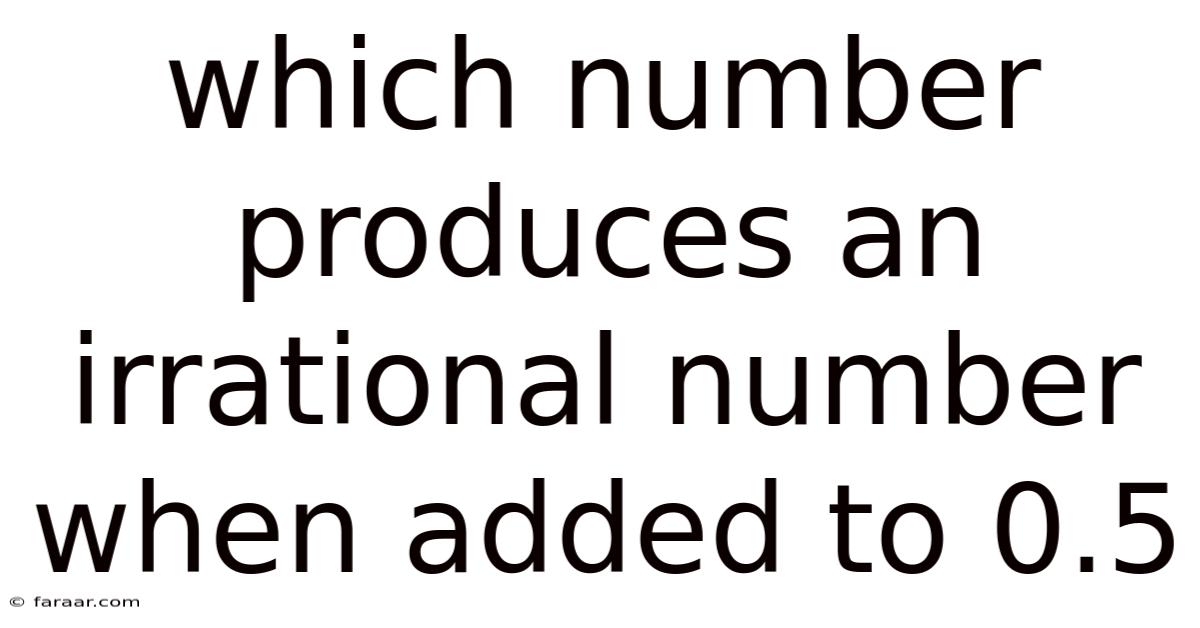Which Number Produces An Irrational Number When Added To 0.5
faraar
Sep 18, 2025 · 4 min read

Table of Contents
Which Number Produces an Irrational Number When Added to 0.5? Unlocking the Mystery of Irrational Numbers
The question, "Which number produces an irrational number when added to 0.5?" might seem deceptively simple. However, it delves into the fascinating world of number systems, specifically the distinction between rational and irrational numbers. Understanding this distinction is key to finding the answer and appreciating the beauty of mathematics. This article will explore this question thoroughly, providing a clear understanding of rational and irrational numbers, the properties of addition, and ultimately, revealing which numbers, when added to 0.5, result in an irrational sum.
Understanding Rational and Irrational Numbers
Before we tackle the main question, let's solidify our understanding of the key players: rational and irrational numbers.
-
Rational Numbers: These are numbers that can be expressed as a fraction p/q, where 'p' and 'q' are integers (whole numbers), and 'q' is not equal to zero. Examples include 1/2, 3/4, -2/5, and even whole numbers like 5 (which can be expressed as 5/1). Decimal representations of rational numbers either terminate (e.g., 0.75) or repeat in a predictable pattern (e.g., 0.333...).
-
Irrational Numbers: These numbers cannot be expressed as a simple fraction of two integers. Their decimal representations are non-terminating and non-repeating. The most famous example is π (pi), approximately 3.14159..., which continues infinitely without any repeating pattern. Other examples include the square root of 2 (√2 ≈ 1.414...) and the golden ratio (φ ≈ 1.618...).
The Additive Property and its Implications
The addition operation, when applied to rational and irrational numbers, exhibits interesting behavior:
-
Rational + Rational = Rational: Adding two rational numbers always results in another rational number. For instance, 1/2 + 1/4 = 3/4. This is easily proven using the rules of fraction addition.
-
Rational + Irrational = Irrational: This is a crucial point for solving our problem. If you add a rational number to an irrational number, the result is always irrational. Intuitively, this makes sense: the non-repeating, non-terminating decimal expansion of the irrational number cannot be "cancelled out" by a rational number with a terminating or repeating decimal representation.
Finding the Solution: Numbers that Produce Irrational Sums with 0.5
Now, let's return to our original question: which number, when added to 0.5 (which is a rational number), produces an irrational number?
Based on the additive property we just discussed, the answer is straightforward: any irrational number.
Adding any irrational number to 0.5 will always yield an irrational result. For example:
- 0.5 + π ≈ 3.64159... (irrational)
- 0.5 + √2 ≈ 1.914... (irrational)
- 0.5 + φ ≈ 2.118... (irrational)
The reason is simple: the irrational component remains, unaffected by the addition of the rational number 0.5. The sum will always have a non-terminating and non-repeating decimal representation.
Exploring Further: Proof and Deeper Understanding
Let's delve a bit deeper and attempt a more formal, though still accessible, proof. We'll use a proof by contradiction.
Assume: The sum of 0.5 and an irrational number 'x' is rational. We can represent this as:
0.5 + x = r (where 'r' is a rational number)
We can rewrite this equation to solve for 'x':
x = r - 0.5
Since 'r' and 0.5 are both rational numbers, their difference (r - 0.5) must also be rational (as shown previously). This implies that 'x' is a rational number.
However, this contradicts our initial assumption that 'x' is an irrational number. Therefore, our initial assumption must be false.
Conclusion: The sum of 0.5 and any irrational number cannot be rational; it must be irrational.
Frequently Asked Questions (FAQ)
-
Q: Can two irrational numbers add up to a rational number? A: Yes, this is possible. For example, consider (√2) + (-√2) = 0, which is a rational number.
-
Q: What about subtracting irrational numbers? A: Similar principles apply. Subtracting a rational number from an irrational number always results in an irrational number. Subtracting two irrational numbers can result in a rational or irrational number.
-
Q: Are all non-repeating decimals irrational? A: Yes, by definition. A repeating decimal can always be expressed as a fraction, thus making it rational.
-
Q: Are there infinitely many irrational numbers? A: Yes, there are infinitely more irrational numbers than rational numbers. This is a fascinating concept in set theory.
Conclusion: The Beauty of Irrationality
This exploration highlights the fundamental differences between rational and irrational numbers. While rational numbers have a neat, structured representation, irrational numbers exhibit a captivating, infinite complexity. Understanding these differences allows us to grasp the answer to our initial question: adding any irrational number to 0.5 will inevitably produce an irrational result. This seemingly simple problem opens a window into the rich and boundless world of numbers, a testament to the elegant intricacy of mathematics. This understanding is not just about solving a single mathematical problem but about developing a deeper appreciation for the fundamental concepts underpinning the number system and the intriguing properties of irrational numbers. The exploration of this problem should inspire further investigation into the fascinating properties of different number systems and mathematical operations. The beauty of mathematics lies not only in the solutions but in the journey of discovery itself.
Latest Posts
Latest Posts
-
Complete The Autoionization Reaction For Water
Sep 18, 2025
-
Aluminum Has A Density Of 2 70 G Cm3
Sep 18, 2025
-
Solve 3x 4y 12 For Y
Sep 18, 2025
-
What Is The Percentage Of 5 3
Sep 18, 2025
-
Find The Value Of X And Z Geometry
Sep 18, 2025
Related Post
Thank you for visiting our website which covers about Which Number Produces An Irrational Number When Added To 0.5 . We hope the information provided has been useful to you. Feel free to contact us if you have any questions or need further assistance. See you next time and don't miss to bookmark.